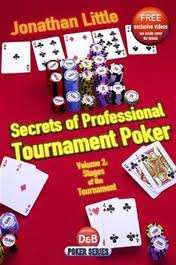 Jonathan Little’s Secrets of Professional Tournament Poker Volume 2 contains the following words of wisdom: “Unlike basically every other area of interest, you do not have to be accomplished to write a poker book. You simply have to know how to look intelligent. Because of this, few poker books contain winning information.” This is quite true, and Little’s numerous successes leave no doubt that he’s among the winning few qualified to dispense advice about how to play cards.
Jonathan Little’s Secrets of Professional Tournament Poker Volume 2 contains the following words of wisdom: “Unlike basically every other area of interest, you do not have to be accomplished to write a poker book. You simply have to know how to look intelligent. Because of this, few poker books contain winning information.” This is quite true, and Little’s numerous successes leave no doubt that he’s among the winning few qualified to dispense advice about how to play cards.
Unfortunately, less than half of this book is about how to play cards. Though it’s subtitled “Stages of the Tournament”, fewer than half of the book’s 270 pages are dedicated to this topic. Ironically, much of the book addresses topics on which Little is not an expert and on which his advice, though delivered with an air of authority, is founded only upon his own anecdotal experience and perhaps a little research.
Little offers superficial, non-expert advice on topics as varied as psychology, nutrition, exercise, investing, traveling, and planning for retirement. Given the number of books qualified experts on these subjects have written, in some cases specifically for a poker playing audience, there’s no reason for a book purporting to offer poker tournament strategy to devote so much space to these topics.
The idea seems to be that this book is about teaching you to be a professional poker player, and so Little wants to address a number of topics that are of practical importance to a professional in addition to teaching specific in-game tactics. The problem is that there are many different kinds of professionals, playing at a wide variety of stakes both live and online and with a wide variety of goals, constraints, abilities, etc.
Secrets doesn’t address a particular audience but instead haphazardly speaks sometimes to one group and sometimes to another. It’s hard to imagine any aspiring professional requiring an explanation of what rake is or an admonition against putting chips in his pocket. On the other hand, even many winning professionals would have a right to feel frustrated when Little says things like, “Assume you can make $200/hour playing poker online,” or “If you have $5 million in your retirement fund, which isn’t too tough to do if you are putting $40,000 towards your retirement every year, you can retire and live the rest of your life doing basically whatever you want.”
These passages are indicative of Little’s general tendency to make it all sound so easy. Throughout the book, there isn’t a lot of empathy for the sorts of challenges aspiring professionals will confront. For example, Little wisely advises tournaments players to practice in heads up sit-and goes so that they’ll be experienced when they get heads up at the end of a tournament. He suggests beginning with $5 heads-up games and moving up in stakes, blithely concluding that, “Keep moving up and you will eventually beat the highest-stakes heads-up games,” as thought all it takes is a little practice to crush the $5Ks.
What poker content there is is good enough. I like Little’s discussion of his general approach to each stage of the tournament (pre-ante/deep stacks, middle stages with antes, bubble, final table, short-handed, heads up), where to find value at each stage, what sorts of mistakes players tend to make, and how to adapt to different sorts of dynamics at each stage. My only regret is that he doesn’t devote more space to these subjects, leaving him to sometimes conclude an interesting discussion with a vague platitude such as, “You should take small risks to gain a lot of chips at times, while other times you should fold without a second thought.”
This discussion opens the book, then is interrupted by a long diversion into all of the largely non-strategy stuff that I mentioned above. At the very end of the book, Little returns to hard strategy with a number of example hands that relate back to concepts discussed in the beginning. These, too, are good, and the beginning and end of the book alone may be enough to justify the $27.95 cover price. Just don’t buy Secrets of Professional Tournament Poker Volume 2 expecting an entire book full of poker strategy, because a lot of it addresses subjects that simply aren’t the author’s area of expertise and on which much better and more thorough information is available elsewhere.
If you found this review helpful and choose to purchase this book, please use this affiliate link to do so: Secrets of Professional Tournament Poker, Vol. 2: Stages of the Tournament
